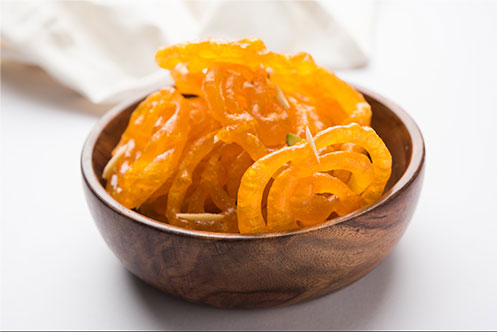What is Jalebi Called in English? The Sweet Treat Everyone Loves but Few Can Translate

What is Jalebi Called in English? The Sweet Treat Everyone Loves but Few Can Translate
Just the mention of jalebi is enough to spark cravings. Golden, crispy, and dripping with syrup, this iconic dessert has become a staple at celebrations across India—whether at weddings, festivals, birthday parties, or even a leisurely Sunday breakfast. In many regions, pairing jalebi with hot milk or even samosas is a tradition that never goes out of style.
Despite its immense popularity, most people struggle to answer a simple question: What is jalebi called in English?
The Irresistible Spiral
Jalebi is instantly recognizable by its coiled, spiral shape. Made from a batter of refined flour—sometimes fermented for extra lightness—it is piped into hot oil or ghee, fried until crisp, and then soaked in sugar syrup. The result is sticky, shiny, and irresistibly sweet.
Jalebi in English
There’s no exact one-word translation for jalebi. However, to describe it to those unfamiliar with the sweet, people often use terms like “Sweet Pretzel” or “Coiled Funnel Cake.” Others go with broader phrases such as “Indian Syrup-Coated Dessert.” These descriptions highlight both its twisted form and its sugary indulgence, helping first-timers understand its essence.
Tracing Its Origins
Interestingly, the name jalebi itself is not originally Indian. It is derived from the Arabic word “Zalabiya,” a similar sweet enjoyed in the Middle East centuries ago. Over time, this delicacy traveled into the Indian subcontinent, where it evolved into countless local variations. Ancient Indian texts also mention sweets with names like “Kundalika” and “Jalavallika,” describing syrup-soaked, circular treats.
Today, jalebi is considered a traditional Indian dessert, but its journey shows how food connects cultures across regions and eras. From Zalabiya in the Middle East to jalebi in India, this crispy, syrupy spiral has delighted generations worldwide.
More Than Just a Sweet
Whether you call it jalebi, sweet pretzel, or syrupy spiral, the charm remains the same. It’s not just a dessert—it’s a celebration, a comfort, and a bite of happiness that transcends language.












